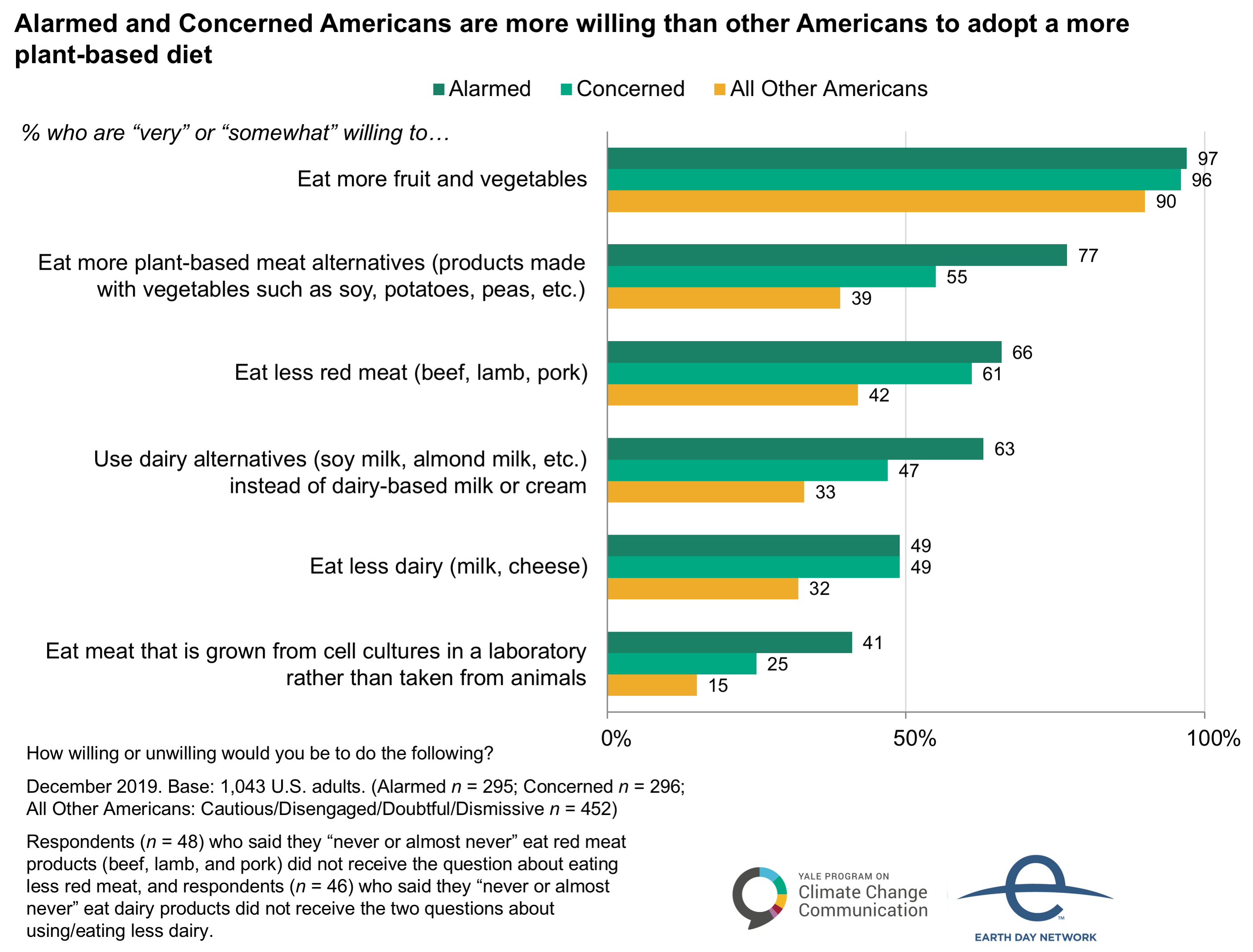Report · Feb 13, 2020
Climate Change and the American Diet
By Anthony Leiserowitz, Matthew Ballew, Seth Rosenthal and Jillian Semaan
7. Global Warming Beliefs and Food-Related Intentions and Actions
7.1. Alarmed and Concerned Americans are more willing than other Americans to adopt a more plant-based diet.
Prior research has found that Americans can be categorized into six distinct groups based on their climate change beliefs, attitudes, and actions (Global Warming’s Six Americas).https://climatecommunication.yale.edu/about/projects/global-warmings-six-americas/,https://climatecommunication.yale.edu/visualizations-data/sassy/ Americans who are “Alarmed” have the highest levels of acceptance and concern about global warming and are the most supportive of pro-climate policies and actions. The “Concerned” also believe that global warming is happening and is a serious – but more distant – threat, so it is viewed as less urgent. The “Cautious,” “Disengaged,” and “Doubtful” are at different stages of understanding the problem, and none are actively engaged with the issue, while the “Dismissive” typically reject the reality, human causation, and seriousness of global warming, and oppose climate action.
The Alarmed and Concerned are more willing to adopt a more plant-based (and therefore climate-friendly) diet than are other Americans (the Cautious, Disengaged, Doubtful, and Dismissive). Nearly all of the Alarmed (97%) and Concerned (96%) are willing to eat more fruit and vegetables compared to 90% of all other Americans. Large majorities of the Alarmed are willing to eat more plant-based meat alternatives (77% vs. 55% of the Concerned and 39% of all others), eat less red meat (66% vs. 61% of the Concerned and 42% of all others), and/or use dairy alternatives instead of dairy-based milk or cream (63% vs. 47% of the Concerned and 33% of all others). About half of the Alarmed (49%) and Concerned (49%) are willing to eat less dairy, compared to 32% of all other Americans.
Four in ten Alarmed Americans (41%) are willing to eat lab-grown meat rather than meat taken from animals, while 25% of the Concerned and 15% of all other Americans are willing to do so.
7.2. More than half of Alarmed Americans frequently look for information and/or talk to family and friends about the environmental impact of different products and/or foods.
More than half of the Alarmed “always,” “often,” or “sometimes” look for information about the environmental impact of different products and/or foods (57%) and/or talk to family and friends about the environmental impact of different products and/or foods (55%). In contrast, 34% of the Concerned and 20% of all other Americans look for information about environmental impacts at this rate, and even fewer talk to family and friends about the issue (25% of the Concerned and 15% of all others).
The Alarmed are also more likely than other Americans to have rewarded and/or punished food companies for their environmental actions. About half of the Alarmed (52%) have rewarded food companies that are taking steps to reduce their impact on the environment by buying their products at least once in the last year, and 42% have punished food companies that are not taking steps by not buying their products. Only 22% of the Concerned and 13% of all other Americans have rewarded food companies for their environmental actions, and fewer (14% of the Concerned and 11% of all others) have punished food companies.

